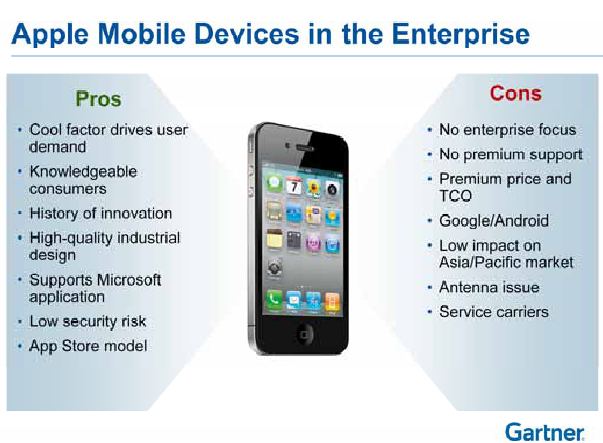Apple in the enterprise: Do the extra costs justify the value?

If you wanted a gauge of the technology executive interest in Apple's role in the enterprise all you needed to see was this presentation at the Gartner Symposium conference in Orlando.
Simply put, the rather large ballroom was packed and seats weren't available. Last year, there was a groundswell of interest around Google Apps. This year's flavor appears to be Apple. "Everyone is trying to figure out supporting the iPhone and pondering the iPad," said one IT exec in the crowd. In addition, the majority of the room---90 percent or so---in a show-of-hands vote said that IT should actively support Apple products.
Not bad for a company that doesn't actively target the enterprise or support it. Gartner fashioned its Apple riff as a debate with voter participation. The biggest takeaway is that technology managers want Apple to support its products in the enterprise.
It's a bit fuzzy whether IT managers want support because they are actively choosing Apple or that they have no choice as employees bring their iPads and iPhones to work. One thing was clear: This wasn't some Apple fanboy crowd you'd find on the West Coast. Gartner analyst Ken Dulaney said he gets 500 to 600 calls a year about the iPhone and the iPad has quickly caught up. "I've never seen anything like this," said Dulaney.
He noted that the Office of the President called Dulaney about using the iPad. Dulaney said he asked: "What about security?" The reply: "We have that covered. Don't worry."
Gartner analyst Michael Silver also said those increased calls are spilling over to the desktop. In a nutshell, CIOs are calling about supporting the Mac OS because they feel like they have to. A few years ago, those calls were about keeping the Mac OS out of the environment. "There's a point coming where companies have to support the Mac," said Silver. "Some companies have adopted a don't ask, don't tell policy for the Macs. We're getting to the point where you have to support multiple devices."
However, Gartner analyst Bill Clark wasn't sold. He said that Apple has had a few near security misses and largely has benefited from its smaller market share. Clark also added that the iPad's lack of support for Flash was a big issue for one pharma company, which had its training and sales video in Adobe's Web video technology.
Ultimately, diversity brings more costs to the company. Gartner analyst Mark Margevicius said that customers are adding more support for the Apple. Those extra people raise costs. "When you add diversity you have to question the value that is gain," said Margevicius. "For most people this (Windows vs. Mac) is a religious battle. Does Apple really add value to the enterprise?"
Margevicius' main point: PCs are a commodity and companies are rightly seeing them as important as another box of paper clips. "When Apple sells a PC at a 30 percent to 40 percent premium you really have to question the value," said Margevicius. He added that enterprises don't exist to give every user a Lamborghini when a GM vehicle gets the job done.
According to Gartner's panel, Windows still matters the most to the enterprise, but IT is nearing a crossover point where the OS becomes a neutral factor. Windows applications will fad into the background as OS agnostic apps and browser-based tools take over. The tipping point: 2012. Meanwhile, enterprises will be cleaning out Windows apps as they prepare for Windows 7 migration. As those Windows apps are cleared out, more OS neutral versions will replace them.
More from Gartner's Symposium:
- IT supervendors: They can buy innovation, but can't maintain it
- Apple's iPad goes to campus: A look at the opportunities, hurdles
Gartner's main conclusion is that companies want employees happy and productive and that may mean Apple. Now that the iPhone supports Microsoft tools like Exchange the hurdle rate for Apple is much lower. The downside is that there's no enterprise support from Apple.
The case for Macs is a little more dicey relative to the iPhone. Consumerization is bringing Macs into the corporate fold and virtual machines are making Windows app a reality. However, there's no enterprise support or roadmap from Apple. Toss in high costs and the Mac is a hard sell.
Add it up and Gartner concludes that Apple's share in the enterprise will roughly double. However, Android may look more like the ultimate pick for corporations.
Bottom line: There will be heterogeneous environments so tools like desktop virtualization and Citrix's Receiver will matter more. Invest to support multiple devices.
